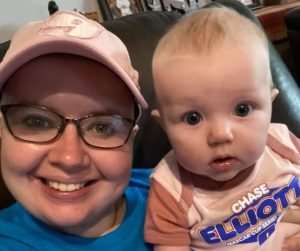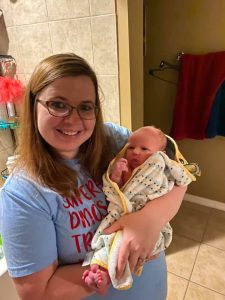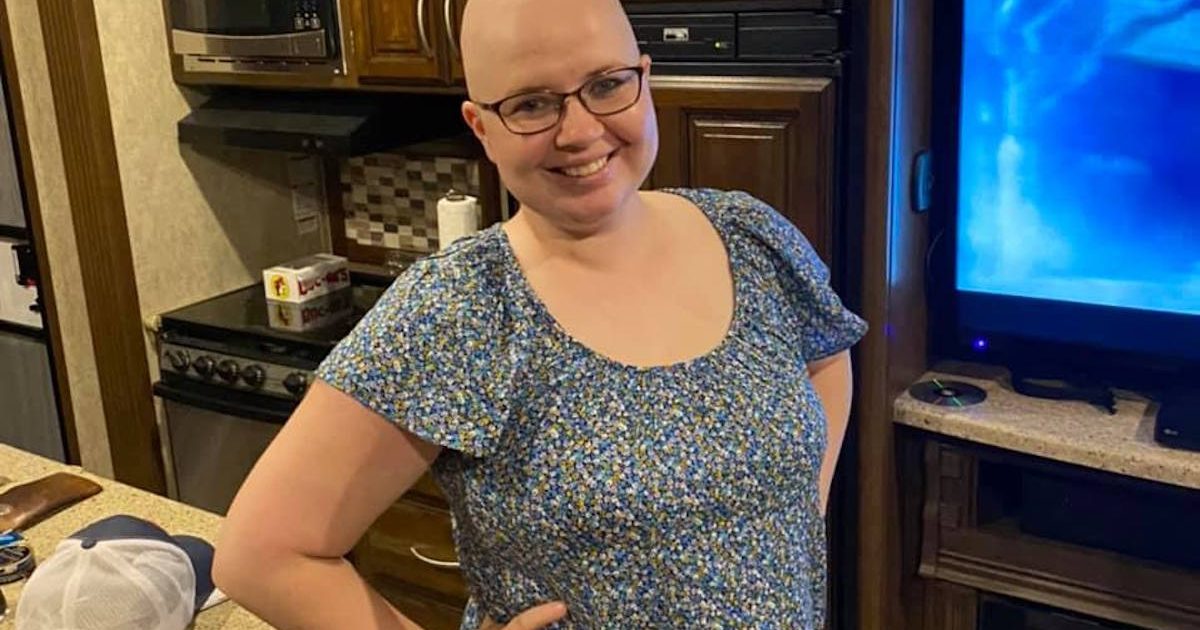Stage IV Breast Cancer Diagnosis Came After Disease Spreads to Her Liver, Brain
- Brittany Mistrot, 30, is a nurse and mother-of-two who discovered a concerning lump while 33 weeks pregnant that doctors dismissed as a clogged milk duct
- She fell in her tub and watched her breasts become engorged after giving birth. Mistrot went back in, and soon after got her stage IV breast cancer diagnosis
- “With advanced disease, the goal of treatment is to keep you as stable as possible, slow the tumor growth and improve your quality of life,” Dr. Elizabeth Comen tells SurvivorNet
That is what stage IV breast cancer warrior Brittany Mistrot takes away from her battle with the disease.
Read More
Stage IV Breast Cancer Misdiagnosis
Doctors told Mistrot a clogged milk duct caused the lump, a common pregnancy symptom in women whose milk comes in before pregnancy. Mistrot grew concerned when she fell in the bathtub and, later, her breasts became engorged after giving birth.Soon after, doctors ran tests and came back with a new diagnosis – breast cancer. Six months after she first went in to inquire about her lump.
“It was like a punch in the gut to me,” Mistrot recalls in an interview with NOLA.com.
The new mother started chemotherapy three months after giving birth before doctors determined if the disease had metastasized in her body.
COVID delays meant that her PET scan results came in after she had started treatment, but doctors were hopeful that Mistrot had stage I or stage II cancer.
The scans revealed the cancer had spread to the liver, lungs, and bones.
That meant a stage IV breast cancer diagnosis for Mistrot.
Then, a month later, doctors learned the disease had spread to Mistrot’s brain.

Stage IV Breast Cancer Warrior
Mistrot is refusing the resign herself to the justifiable self-pity and depression many would experience in this situation.
She even found the humor in having to shave her head.
"I knew it was coming as a nurse. I knew it was inevitable," says Mistrot. "My husband is bald, so it makes the punch a little less. He's always giving me tips on how to care for the bald head. It's our joke: We match now."
Mistrot is also staying very busy doing administrative work at the hospital and doubling up on classes to get her graduate degree.

Stage IV Breast Cancer Regrets
The only time she seems to get emotional is when speaking about her family, concerned more about the impact cancer is having on them than herself.
“It's never been, 'Why me?' It's, 'Why my family?’" explains Mistrot.
“Why do they deserve this to be part of their story? I refuse to believe this is it, and God gave me these kids to take me away from this early."
The kids — 5-month-old daughter Bristol and 3-year-old son Beau — have not been told about mom’s battle, while her husband is trying to make the most out of the time the two have together.
"We can't look 82 years into the future saying we'll be old together. Now, it's, 'How much time can we have together?' It's changed everything," says Brendon Mistrot. "We are trying to see as much and do a much together as we can."
His wife is also trying to make sure other families never experience the pain her loved ones are going through now.
"My hope is that my story can help other people and give them strength. When I was getting treatments at the cancer center, there's so many people, women, and men, young and old, and no one was giving up. That's important in anyone's cancer journey: Not giving up," points out Mistrot.
"I hope my strength and my story can help other people in their journey. To see a light at the end of the tunnel as dark and as grim as it may be."
What Is Stage IV Breast Cancer
Stage IV breast cancer means that the disease has spread from the breast to distant areas of the body.
And while there is no cure for stage IV breast cancer, doctors have several options for treating the disease.
Hormone therapy, chemotherapy, and targeted drugs are just a few, while some like Mistrot receive radiation and possible surgery.
“With advanced disease, the goal of treatment is to keep you as stable as possible, slow the tumor growth and improve your quality of life,” Dr. Elizabeth Comen, medical oncologist at Memorial Sloan Kettering Cancer Center, previously told SurvivorNet.
What Is Stage IV Breast Cancer?
Importance of Second Opinion and Value of Comprehensive Cancer Care Center
Brittany Mistrot regrets not advocating for her own health after doctors misdiagnosed her breast cancer as a blocked milk duct.
She accepted the diagnosis and did not get a second opinion from a facility or practice specializing in oncology, such as a comprehensive cancer care center. She did seek treatment at one of the country’s best care centers after her diagnosis, though, MD Anderson in Houston.
Those facilities – of which there are 71 in the United States – offer a team-based approach to diagnosing and treating cancer, with a team that often includes a surgical oncologist, medical oncologist, pathologist, radiologist, and other specialists.
These doctors convene to form a tumor board where they discuss each case, often and in-depth. These meetings assure that everyone is on the same page and allow your team to monitor the results in real-time and tweak or refine your treatment when needed. The National Cancer Institute provides a list of all cancer centers in the United States.
Not every person requires treatment at a major cancer center, but there are benefits for those battling a rare form of the disease. These centers are also not treating members of the general population who have contracted COVID, unlike other medical facilities which are still dealing with patient overflow.
In a previous interview with SurvivorNet, Dr. Ramez Eskander, an oncologist at UC San Diego Health, offered tips for patients selecting a treatment center.
"Figuring out where to go can be an incredibly complex question," said Dr. Eskander. “Very often, I have families walk into my office and say, 'I don't know where to start or 'I didn’t know where to start,' or 'I was told that I may have cancer, and my physician said to go to a particular provider…'"
Dr. Eskander recommends patients seek treatment at NCI-designated cancer centers.
Those facilities meet rigorous standards for transdisciplinary and state-of-the-art research while focusing on new approaches to preventing, diagnosing, and treating cancer.
How to Choose a Cancer-Care-Team
What does that mean? Dr. Eskander explained:
- NCI-designated cancer centers have opportunities for clinical trial enrollment, which can benefit patients as they devise treatment plans after their initial diagnosis and in the unfortunate event of a recurrence
- Doctors work collaboratively with specialists who have specific expertise on everything from diet and fitness to the particular organ or part of the body where cancer has been located, which provides patients with more knowledge ahead of any treatment decisions and often results in a far higher standard of care.
- NCI-designated cancer centers will likely offer patients access to support groups and social networks.
- Patients may have access to chemotherapy education classes to learn about the drugs they’re receiving for treatment.
“We have research infrastructure built into the cancer center that’s continually driving drug discovery and opportunities to hopefully help our patients now and potentially our patients in the future,” explained Dr. Eskander. “I take pride in saying that UC San Diego is the only NCI-designated comprehensive cancer center in San Diego County."
Seeking Care at a Comprehensive Cancer Center
Learn more about SurvivorNet's rigorous medical review process.

